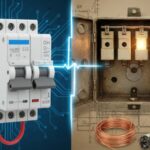Have you ever noticed your lights flickering when you turn on the microwave? Or maybe your breakers keep tripping every time you plug in a new appliance? These are classic signs that the electrical system in your home is struggling to keep up, and it might be time for an electrical panel upgrade.
Your electrical panel is essentially the heart of your home’s power system. It distributes electricity to every room and device, keeping things running safely and efficiently. But as technology advances and our homes rely on more power-hungry devices, older panels simply can’t handle the load. That is where an upgrade can make a significant difference.
Understanding What an Electrical Panel Upgrade Really Means
An electrical panel upgrade involves replacing your old fuse box or circuit breaker panel with a new one that can handle higher electrical demands. Older homes often have 60-amp or 100-amp panels, which were sufficient decades ago, but modern households typically need at least 200 amps to support today’s living.
You may think of it like upgrading from a flip phone to a smartphone. Both get the job done, but the newer model offers more functionality, better performance, and added safety. With an upgraded panel, your home can safely support everything from high-efficiency HVAC systems to EV chargers and smart home devices without overloading the circuits.
Why an Electrical Panel Upgrade Is Worth the Investment
Home upgrades can be expensive, so it’s natural to wonder if this one is necessary. The truth is that an electrical panel upgrade is one of those improvements that pays for itself over time.
First, it improves safety. Old or outdated panels can overheat, cause flickering lights, or even spark electrical fires. New panels use better materials, stronger circuit breakers, and safer wiring that significantly reduce these risks.
Second, it improves performance. You’ll notice fewer power interruptions, steadier voltage, and the ability to run multiple appliances at once. If you’re planning to add solar panels, a hot tub, or a new EV charger, the extra capacity will be essential.
Finally, it boosts your home’s value. Homebuyers often look for properties that are “move-in ready” with an updated electrical panel. It shows that your home is safe, efficient, and up to modern standards.
Signs You Might Need an Electrical Panel Upgrade
Not sure if your home needs an upgrade? Here are some signs:
- Your breakers trip often, or fuses blow regularly.
- Lights flicker when you turn on appliances.
- You rely heavily on power strips or extension cords.
- Your panel feels warm or smells burnt.
- The panel has not been inspected or replaced in over 25 years.
If any of these sound familiar, it’s time to have a licensed electrician assess your system. They can determine whether a full electrical panel upgrade is needed or if minor adjustments will suffice.
What Happens During the Upgrade Process
Here’s a step-by-step guide to an electrical panel upgrade:
- Inspection: The electrician checks your existing system, calculates your power needs, and identifies any potential safety concerns.
- Power Off: The power is temporarily shut off to safely remove the old panel.
- Installation: A new, higher-capacity breaker box is installed, complete with upgraded wiring, grounding, and labeling for each circuit.
- Testing: The system is tested to ensure everything works correctly.
Most upgrades take about one full day to complete, though larger homes or complex setups may take longer.
The Long-Term Benefits You’ll Notice
Once your electrical panel is upgraded, you’ll immediately notice the difference. No more tripping breakers or dimming lights when multiple appliances are in use. Your home will be ready for future tech upgrades, whether that’s a high-end kitchen renovation, a home office setup, or EV charging.
Final Thought
A strong and reliable electrical system is a necessity in today’s world, where almost everything runs on electricity. An electrical panel upgrade ensures that your home stays safe, efficient, and ready for the future. Whether you’re experiencing constant power issues or just want to modernize your home’s electrical setup, upgrading your panel is one of the smartest moves you can make.
FAQs
- How often should I upgrade my electrical panel?
Most panels last about 25–30 years. - Can I upgrade my panel myself?
No, this is a job for a licensed electrician. - Will upgrading my panel lower my electricity bill?
Not directly, but it can improve efficiency and help your appliances run better, which may lead to energy savings over time. - Do I need an electrical panel upgrade to install an EV charger?
In most cases, yes. EV chargers require additional power capacity that older panels may not support. - How long does the process take?
Most upgrades are completed in one day, though large homes or complex wiring setups may take up to two days.



